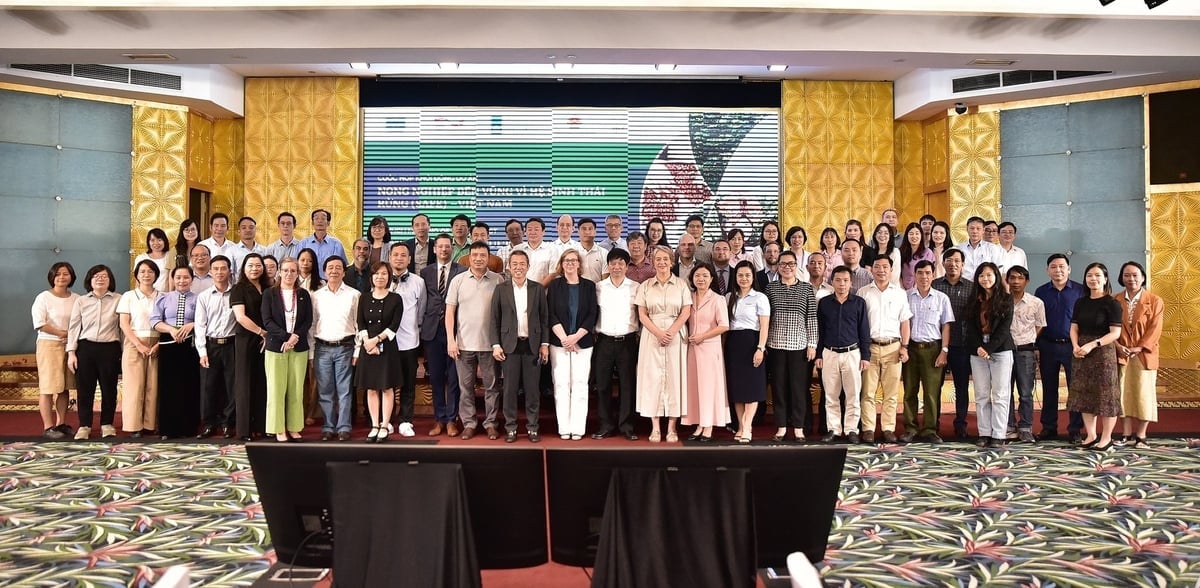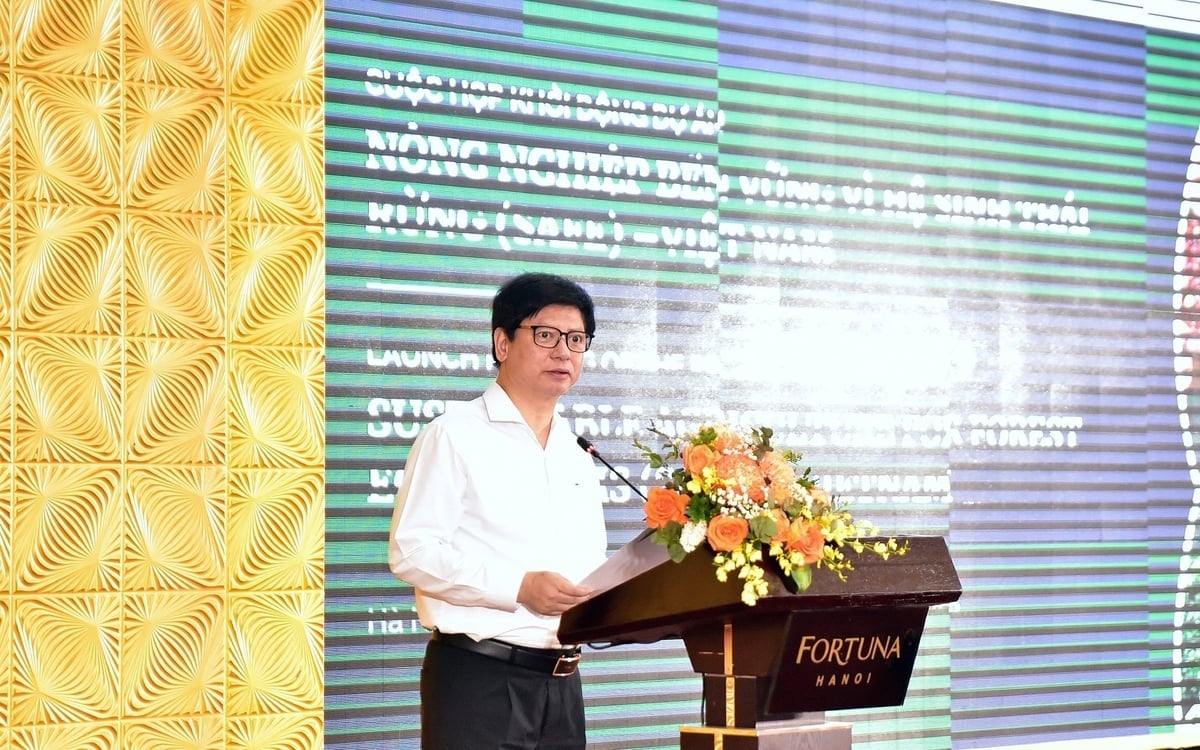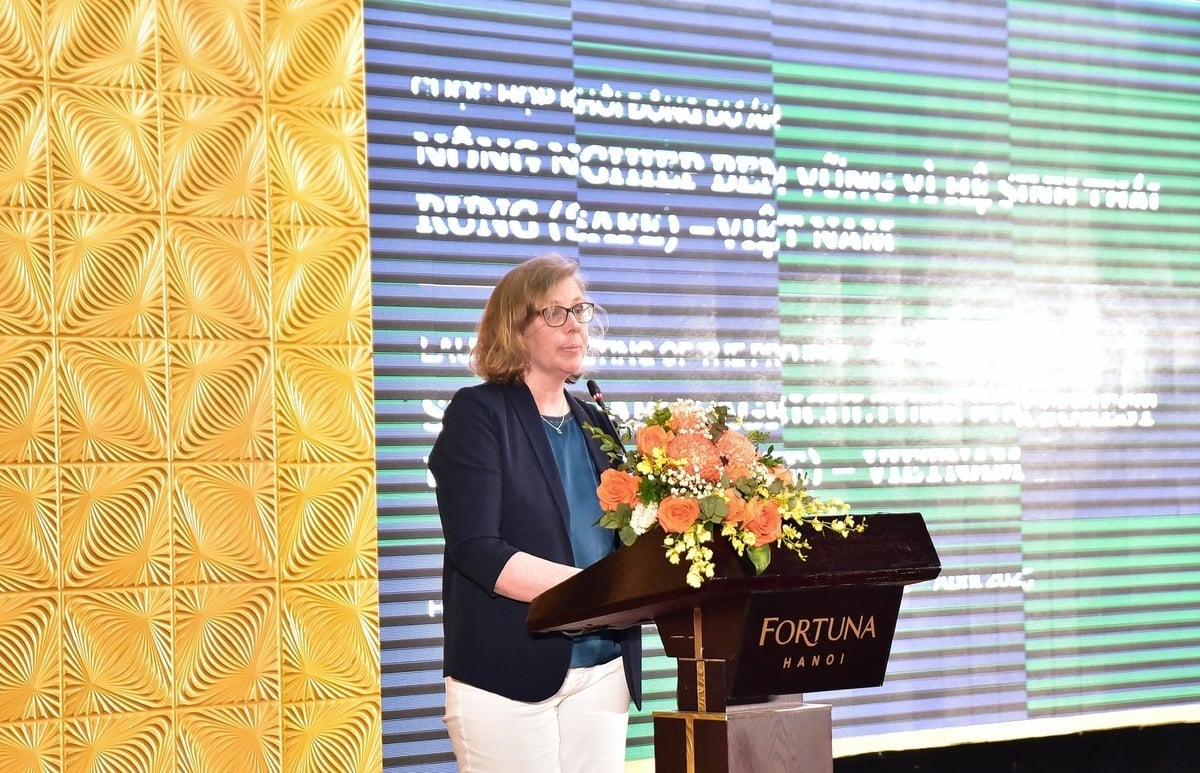December 2, 2025 | 08:45 GMT +7
December 2, 2025 | 08:45 GMT +7
Hotline: 0913.378.918
December 2, 2025 | 08:45 GMT +7
Hotline: 0913.378.918

On the morning of April 22, the Ministry of Agriculture and Environment (MAE), in collaboration with the German Agency for International Cooperation (GIZ), held the kick-off workshop for the project Sustainable Agriculture for Forest Ecosystems in Vietnam (SAFE) for the 2025-2028 period. Photo: Kieu Chi.
The kick-off workshop served as a platform to connect stakeholders across the coffee value chain, enabling them to share a common vision, align on action directions, and establish coordination mechanisms for the next phase. The SAFE project in Vietnam will be officially implemented in two key provinces, Son La and Gia Lai.
In his opening remarks, Mr. Pham Ngoc Mau, Deputy Director General of the International Cooperation Department (MAE), emphasized that the SAFE project in Vietnam aims to promote a comprehensive transformation of the coffee supply chain towards legality, sustainability, and zero deforestation. This, in turn, will enhance the competitiveness of Vietnamese coffee in the European Union (EU) market.

Mr. Pham Ngoc Mau, Deputy Director General of the International Cooperation Department (MAE), delivered remarks at the kick-off workshop for the project Sustainable Agriculture for Forest Ecosystems in Vietnam (SAFE). Photo: Kieu Chi.
Currently, to address deforestation and forest degradation caused by production supply chains, the EU has issued the Deforestation Regulation (EUDR). Among Vietnam’s key export commodities, three sectors, which are rubber, coffee, and timber directly affected by this regulation.
The project will support businesses and farmers in quickly adapting to the new requirements, maintaining stable production, and expanding their market share in Europe. At the same time, it aims to promote sustainable production practices, strengthen climate resilience, and protect natural resources, thereby advancing sustainable agricultural transformation. It supports the implementation of Vietnam's sustainable agricultureand rural development strategy for 2021-2030, with a vision to 2050.
Coffee is one of Vietnam’s top export commodities, achieving a record export value of USD 5.6 billion in 2024, with the EU being one of the largest markets for Vietnamese coffee.
According to Mr. Pham Ngoc Mau, MAE is committed to working alongside localities, businesses, and organizations to overcome the challenges posed by the EUDR and to realize the goal of deforestation-free development in the era of global green trade.

Head of Cooperation at the EU Delegation to Vietnam: The project aims to build a deforestation-free supply chain aligned with the European Union’s new regulations. Photo: Kieu Chi.
According to Ms. Kristina Bünde, Head of Cooperation at the EU Delegation to Vietnam, the SAFE project in Vietnam is designed to support farmers in transitioning toward sustainable production, demonstrating responsibility toward climate action, biodiversity conservation, and the protection of the rights and livelihoods of forest-dependent communities.
The project also emphasizes gender mainstreaming and support for vulnerable groups in complying with EUDR requirements, ensuring a just transition and promoting equal participation and sustainable livelihoods in Vietnam’s coffee supply chain.
The SAFE project in Vietnam is expected to provide technical training to 8,000 coffee farming households on sustainable coffee production, climate change adaptation, forest protection, and traceability management. It will also coordinate with the central and local EUDR Joint Working Groups to support the implementation of EUDR action plans through dialogue platforms and information-sharing forums.
In addition, three EUDR compliance guideline documents integrating gender and social aspects will be developed and disseminated to stakeholders. Six public-private partnership (PPP) models aimed at EUDR compliance and export market connectivity will be supported and implemented. EUDR compliance content will be integrated into Training of Trainers (ToT) and Training of Farmers (ToF) materials. Technical staff from both public and private sectors will receive capacity-building on sustainable coffee production, forest conservation, and EUDR compliance.
By implementing activities in ten countries, Brazil, Burundi,Cameroon, the Democratic Republic of the Congo (DRC), Ecuador, Indonesia, Peru, Uganda, Vietnam and Zambia, SAFE project aims to support a just transition towards deforestation free and legal value chains. SAFE provides technical assistance, strengthens capacities, scales up traceability systems, and supports reliable and stable partnerships, including through exchange and learning amongst a widerange of actors.
In Vietnam, SAFE project helps actors in the coffee value chain to prepare through activities such as testing digitalised traceability systems, registering farm plots, and strengthening capacity on climate-resilient production and business skills.The projects facilitate multi-stakeholder dialogues and thei mplementation of respective action plans at provincial and national level.
Translated by Kieu Chi

(VAN) The Institute of Agricultural Sciences for Southern Vietnam (IAS) marked its 100th anniversary in Ho Chi Minh City, celebrating a century of growth as a leading institute contributing significantly to Viet Nam’s agricultural development.

(VAN) An increasing number of livestock farms are using biogas generators to create a source of renewable electricity, helping to save costs and mitigate environmental pollution.

(VAN) Small changes in rice cultivation, from irrigation methods and straw collection to input management, are paving a new way for Vietnam's agriculture in the journey toward emission reduction.

(VAN) With the project of converting biogas into renewable electricity, Australia is both helping pig farms reduce their energy costs by up to 25% and contributing to environmental protection.
![Hue aims for Net Zero: [1] Initial steps from green transportation](https://t.ex-cdn.com/nongnghiepmoitruong.vn/608w/files/huytd/2025/11/28/0853-anh-6-giao-thong-xanh-hue-094717_940-153724.jpg)
(VAN) For sustainable development, Hue City is implementing many solutions to promote green transportation, which is an important initial step on the journey to building a Net Zero Hue.

(VAN) Nghe An Province, one of the localities with the largest forest area in Vietnam, is set to gain significant benefits from the implementation of forest carbon credit payments.

(VAN) Circular agriculture helps Mekong Delta farmers cut greenhouse gas emissions while boosting incomes through efficient reuse of agricultural by-products.